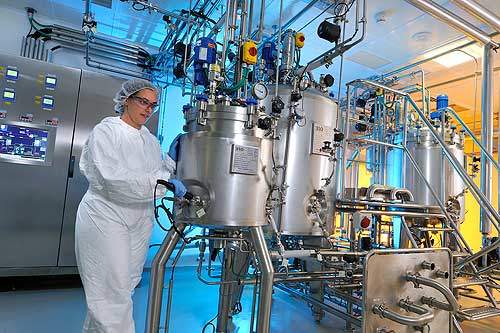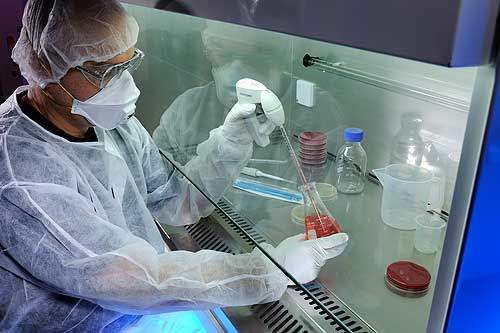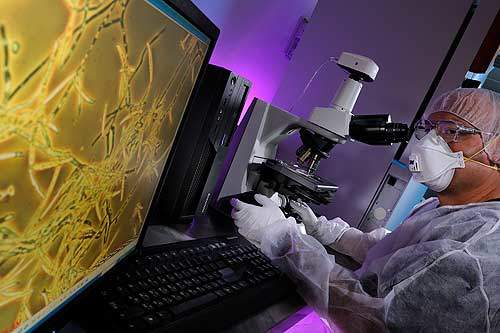SAFC operates a contract manufacturing fermentation facility in Jerusalem, Israel. The facility is EU and FDA compliant and has been designed to meet the statutory requirements at all stages of the drug development process.
It offers fermentation based high potent active pharmaceutical ingredients (API) development on a large scale.
Expansion
A $25m expansion to the facility was completed in October 2010. The expansion has boosted the capacity for the development and production of large-scale, high-potency, toxic or dangerous drug substances, including secondary metabolites cytotoxins and large-molecule proteins. The expanded facility is expected to begin operations in 2011.
Facility
The facility spans 50,000ft² and accommodates custom designed Class 100,000 (ISO 8) fermentation and harvesting manufacturing clean rooms that have been designed to meet the most stringent requirements of biohazard fermentation and HPAPI manufacturing.
Each fermentation and harvesting room is installed with biohazard cabinets. The suites are equipped with a range of fermentors of 19l, 100l, 1,000l and 4,000l capacities for both batch and fed-batch operations. The suites are additionally installed with temperature-controlled stirred processing vessels, fully automated piston discharge high-speed centrifuge, continuous disc stack centrifuge and high-pressure homogeniser.
The facility is designed to operate at Biosafety Level 2. Approximately 30,000ft² of the facility’s area is Biosafety Level 2 compliant, allowing the manipulation of risk-group 2 microorganisms.
The Class 100,000 (ISO 8) recovery clean rooms are designed with an explosion proof environment. There are segregated Class 10,000 (ISO 7) purification clean suites that are installed with Class 100 (ISO 5) safety cabinets. Each manufacturing area is airlocked and provided with 100% HEPA filtered single pass air by a HVAC system. The setting prevents cross contamination, besides protecting the environment and ensuring the safety of the personnel.
The biohazard cabinets generate master and working cell banks of natural or recombinant microorganisms up to Risk Group 2 (RG2) pathogens. The purpose built banks are housed within temperature controlled biostorage inside the facility.
The facility is also equipped with Fast Protein Liquid Chromatography (FPLC), Medium Pressure Liquid Chromatography (MPLC) and Cross flow process scale ultra / diafiltration capabilities. A 550l evaporation train is also installed. Additional equipment within the facility includes 200l liquid-liquid extraction column and Lyofast 5 pharmaceutical freeze dryer. All equipments are jacketed and explosion proof. The facility has the required cleaning and sterilisation / sanitisation in place (CIP, SIP) systems.
Technology
The facility develops therapeutic proteins through fermentation technology. The main technologies adopted include yeast fermentation, fungi fermentation and bacterial fermentation. Microorganisms including bacteria, streptomycetes, filamentous fungi and yeast are cultivated. During the process, microbial growth kinetics and homogeneity of the culture is continuously monitored. Temperature, pH, agitation, pressure and turbidity are also monitored throughout the process of fermentation. Using suitable analytical methods, any accumulation of product or impurities is also monitored during the process.
After meeting a pre-specified criteria including physical, microbial and product accumulation endpoints, the culture is harvested to separate the biomass or broth. From the fermentation broth or the biomass, the native or recombinant proteins are recovered. Yields are optimised through both upstream and downstream process development.
The facility is equipped to perform downstream processing of aqueous products and organic solvent based products. The primary technologies include centrifugation, homogenisation, concentration, separation, process chromatography, organic extraction, and adsorption.
During the final phase of purification, the desired product is separated at the highest purity level and retained.
Manufacturing
The facility develops and manufactures therapeutic proteins to support client requirements from the pre-clinical to the commercialisation stage. It uses E.coli, streptomyces sp., filamentous fungi and yeast, including risk group 2 human pathogens to develop multiple products including secondary metabolites, cytotoxins and highly-potent large-molecule proteins.
Analytical services offered by the facility include analytical method development and validation, raw material, in process and final product release testing, stability testing and cleaning efficiency testing.





